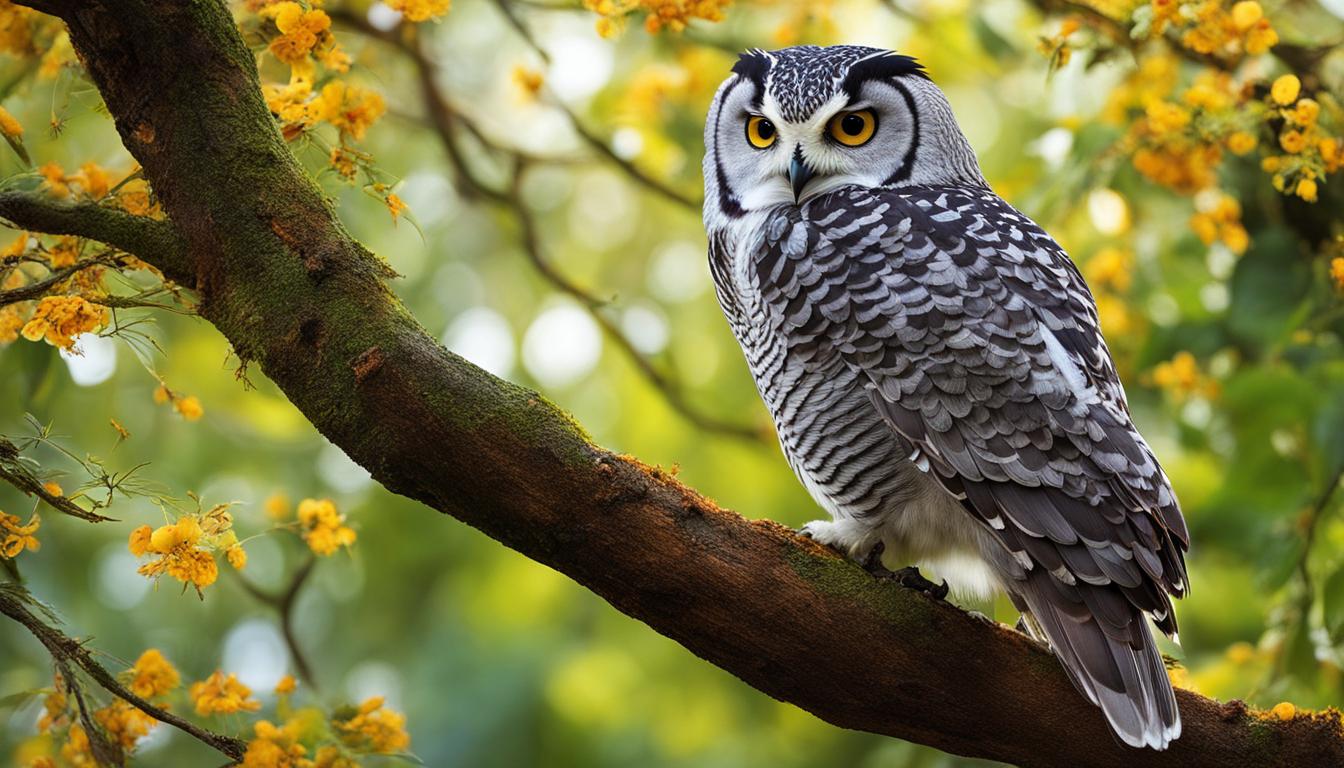Originally posted on November 16, 2023 @ 5:38 am
Welcome to our Feathered Fortune Guide, where we explore the intriguing world of bird superstitions and fortunate bird symbols. Have you ever wondered which bird is a symbol of good luck? From ancient beliefs to modern traditions, there is a rich history of avian lore associated with prosperity and fortune. Join us on a journey through the symbolic meanings of lucky birds and uncover the positive energy they bring.
In this article, we will delve into the mysteries of bird symbolism and examine the beliefs behind various bird species that are considered good fortune-bringers. From the majestic phoenix to the charming hummingbird, we will discover the intriguing avian mythology that has been passed down through generations.
Key Takeaways:
- Various cultures have developed their own beliefs about the positive qualities certain birds possess.
- The phoenix is a powerful symbol of good luck, associated with renewal, transformation, and prosperity.
- The owl is often considered a harbinger of good luck, bringing protection, intuition, and wisdom.
- The presence of a hummingbird is believed to bring good fortune, happiness, and love.
- The crane is considered a symbol of longevity and prosperity, bringing wealth, good health, and good luck.
Understanding Bird Symbolism and Superstitions
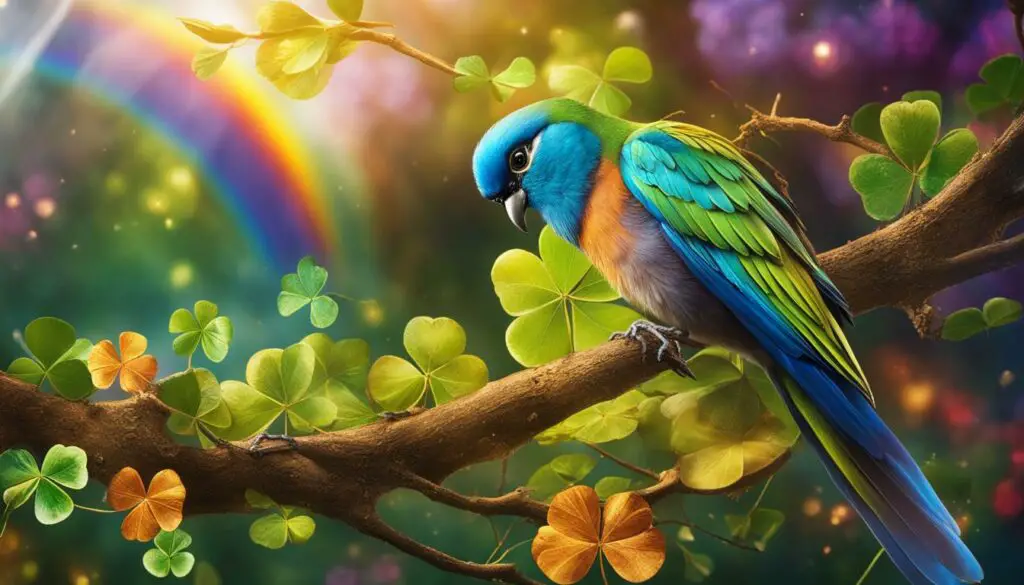
Since ancient times, birds have been seen as powerful symbols in cultures around the world. They are often associated with freedom, flight, and the divine. But beyond these generalizations, different species of birds have been attributed with specific symbolic meanings.
For example, the eagle is commonly associated with strength and courage, while the dove is often seen as a symbol of peace and love. Understanding these symbolic associations can help us interpret the messages that birds bring into our lives.
Bird symbolism can also be influenced by superstitions, which are beliefs or practices that are not necessarily based on reason or scientific evidence. Superstitions related to birds can vary widely between cultures and regions, but some common examples include:
- A bird flying into your house is a sign of good luck.
- Killing a sparrow brings bad luck.
- Seeing a pair of lovebirds is a sign of romance and happiness.
- Wishing on a bird’s feather can make your wish come true.
Whether or not we believe in these superstitions, they demonstrate the deep cultural significance of birds and the symbolism they hold. By paying attention to the birds we encounter in our daily lives, we can tap into the wisdom and guidance they may offer.
“Birds are the eyes of heaven, and they have the power to enlighten us about the world around us.” – St. Francis of Assisi
The Majestic Phoenix: A Symbol of Resurrection and Good Luck
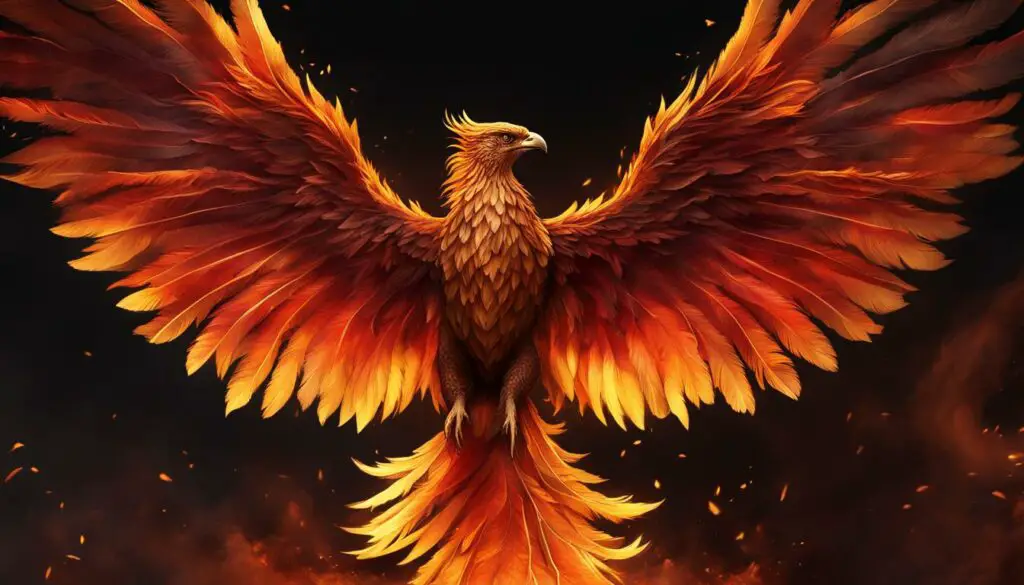
When it comes to lucky birds, the phoenix is one of the most powerful symbols of good fortune. This mythical bird has been a symbol of renewal, transformation, and prosperity for centuries.
The phoenix is often depicted with vibrant plumage and the ability to rise from its own ashes, representing the cycle of life, death, and rebirth. This bird’s association with resurrection and renewal makes it an auspicious symbol in various cultures.
In Chinese mythology, the phoenix is known as the Fenghuang and is believed to bring good luck and prosperity. It is often depicted with the dragon, another auspicious symbol. In ancient Greek mythology, the phoenix is associated with the sun and is believed to rise anew each morning, bringing hope and good fortune.
The Symbolism of the Phoenix
The phoenix is a powerful symbol of positive energy and potential for great fortune.
- Renewal: The phoenix is associated with new beginnings and transformation. Its ability to rise from its own ashes represents the power to start over and begin anew.
- Prosperity: The phoenix is believed to bring good luck and wealth to those who encounter it. Its association with the sun and fire also symbolizes abundance and vitality.
- Strength: The phoenix is a symbol of resilience and endurance. Its ability to rise from the ashes represents the strength to overcome adversity and emerge stronger than before.
Embrace the positive energy and symbolism of the phoenix, and may it bring you good luck and prosperity.
The Wise and Fortunate Owl
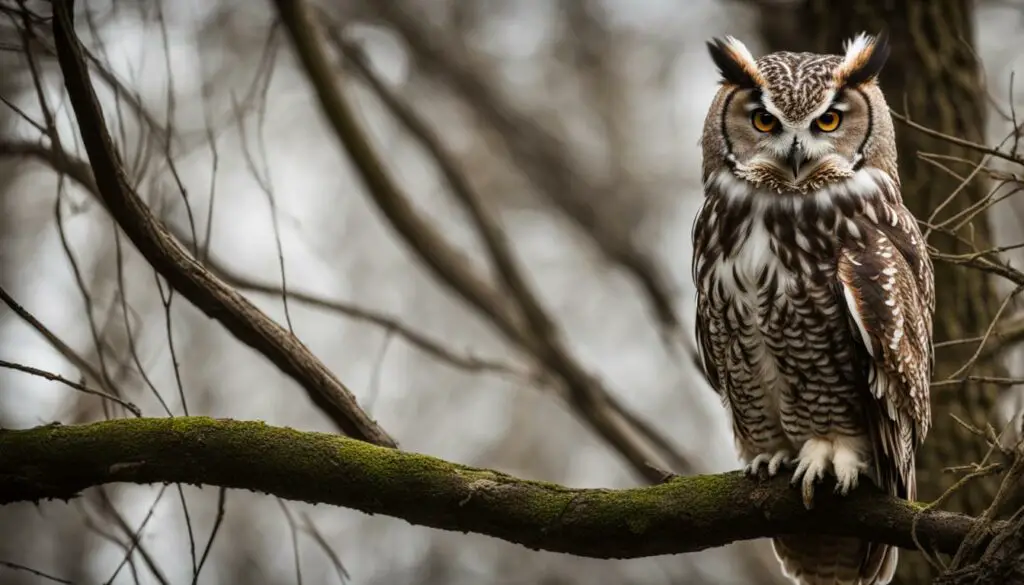
The owl has been a symbol of wisdom and mystery for centuries, and it is no surprise that it is also considered a lucky bird in many cultures. In fact, in ancient Greece, the owl was believed to bring good fortune to the army during battles.
The owl’s reputation as a lucky bird comes from its association with protection, intuition, and wisdom. The Native American tribes believe that the hooting of owls brings good luck and prosperity, while the ancient Egyptians considered the owl a symbol of protection against evil spirits.
The superstitions surrounding the owl are not limited to ancient cultures. In modern times, it is believed that an owl sighting can bring good luck, especially if the owl crosses your path or perches on your rooftop.
Despite its positive reputation, the owl is also associated with some negative superstitions. In some cultures, the hooting of an owl is seen as a portent of death or illness. Similarly, the piercing stare of an owl is often associated with the evil eye in many cultures, which is believed to bring bad luck and misfortune.
Types of Owl Superstitions
There are different owl superstitions associated with various types of owls. For example, the barn owl is considered to be a lucky bird in some cultures, especially in Europe, where it is believed to bring good fortune and fertility.
On the other hand, the screech owl is often associated with negative superstitions, such as death and illness.
The Owl in Popular Culture
The owl’s symbolism and superstitions have made it a popular subject in art, literature, and pop culture. From the wise old owl in children’s books to the iconic owl used as a logo by companies, the owl’s association with wisdom and luck has made it a beloved character in many stories.
“A wise old owl sat on an oak; The more he saw, the less he spoke; The less he spoke, the more he heard; Why aren’t we like that wise old bird?” – Edward Hersey Richards
The owl’s reputation as a lucky bird is well-deserved, as it continues to be a symbol of protection, intuition, and wisdom in many cultures. So the next time you spot an owl, take it as a sign of good luck and prosperity!
The Charming and Fortuitous Hummingbird
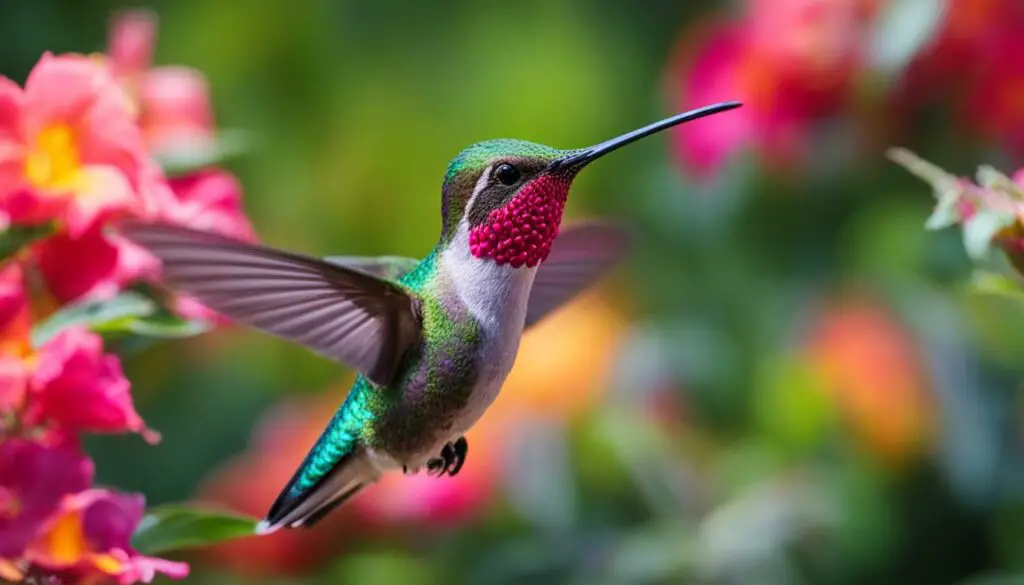
With their vibrant colors and swift movements, hummingbirds are associated with luck, joy, and positivity. These tiny birds are believed to bring good fortune, happiness, and love into the lives of those who encounter them. Their presence is often seen as a sign of abundance and fulfillment.
Hummingbirds are known to symbolize resilience and adaptability due to their ability to fly in any direction, including backward. Their unique movements and ability to hover in place have also led to their association with agility and quick thinking, qualities that are highly valued in many cultures.
Throughout history, hummingbirds have been seen as messengers of good luck. The indigenous peoples of the Americas believed that hummingbirds brought blessings of love, luck, and joy. In Japan, hummingbirds are seen as symbols of good luck and good health.
| Symbolic Meanings of the Hummingbird | Culture |
|---|---|
| Love, Luck, and Joy | Indigenous Peoples of the Americas |
| Good Luck and Good Health | Japan |
The hummingbird’s association with good luck and positivity makes it a popular subject in art and literature. From ancient myths to modern-day folklore, these birds continue to inspire wonder and awe.
The Elegant Crane: A Symbol of Longevity and Prosperity

The crane, known for its graceful appearance and long lifespan, has been revered as a symbol of good luck and prosperity across various cultures. In Japan, it is believed that cranes bring good fortune, long life, and good health. In Chinese culture, the crane is associated with longevity and purity.
Fun fact: In Japanese mythology, the crane is said to live for a thousand years, and anyone who folds a thousand origami cranes will have their wish granted.
Not only is the crane associated with good fortune, but it is also considered a symbol of elegance and sophistication. The bird’s long legs and graceful movements have inspired many artists and designers over the centuries. In fact, cranes are a popular motif in Japanese art, often depicted alongside cherry blossoms and other symbols of good luck.
Due to its positive connotations, the crane has become a staple in various celebrations, such as weddings, new year’s, and other important events. In some cultures, it is customary to gift a pair of crane figurines to newlyweds to represent a long and prosperous marriage.
Pro tip: If you’re looking to attract good luck and prosperity into your life, consider incorporating images or sculptures of cranes into your home or workspace.
The Symbolic Raven: A Messenger of Good Luck
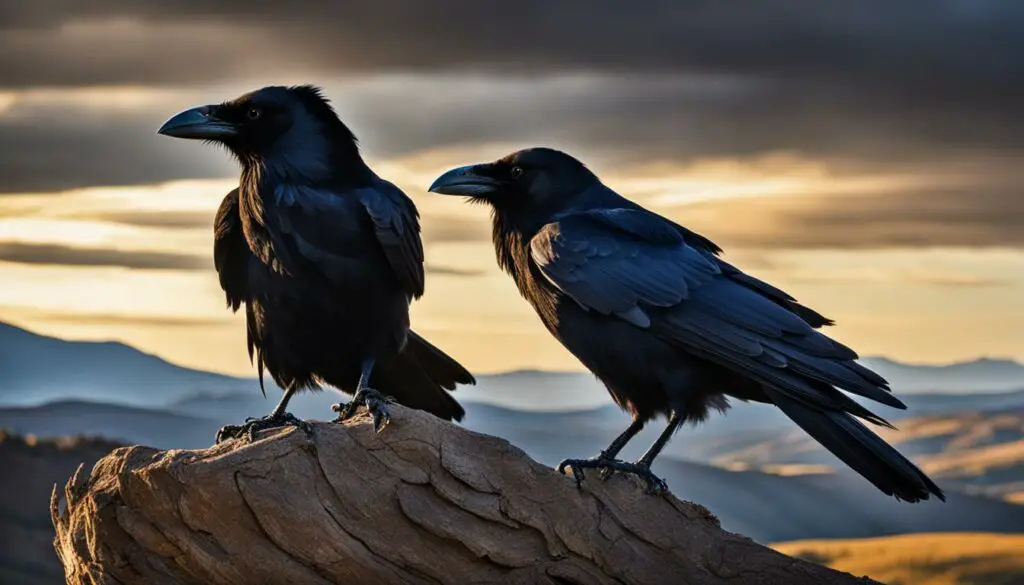
When it comes to lucky birds, the raven is often at the top of the list. This mysterious and intelligent bird has been associated with positive omens in many cultures throughout history.
According to bird superstitions, the presence of a raven brings good luck, protection, and ancestral wisdom. The raven’s dark feathers and piercing eyes contribute to its mystical reputation, and many people believe that encountering a raven is a sign of good things to come.
In Native American mythology, the raven is often seen as a trickster figure who brings knowledge and change. In Norse mythology, the god Odin had two ravens, Hugin and Munin, who would fly around the world and bring him information. In Celtic mythology, the goddess Morrigan was often associated with ravens, who were seen as protectors and messengers of war.
“The raven is a messenger of good luck, bringing knowledge, protection, and ancestral wisdom.”
Despite its association with death and darkness, the raven is a bird that is deeply intertwined with positive symbolism and luck. Whether you spot one in the wild or incorporate its image into your home decor, the raven is a creature that is sure to bring a sense of mystery and enchantment into your life.
Next, we will explore the serene dove, another bird associated with good fortune and positive energy.
The Serene Dove: A Symbol of Peace and Good Fortune
https://www.youtube.com/watch?v=OSrsG1eHVWs
The dove has long been a symbol of peace and love, but did you know that it is also associated with good luck and prosperity? In various cultures, the presence of a dove is believed to bring blessings, positive energy, and good fortune.
This bird’s symbolism is deeply rooted in its connection to tranquility and goodwill. Its gentle nature and soothing coos evoke feelings of calmness, making it a popular subject in art and literature. From ancient times to modern-day, people continue to hold the dove in high regard as a symbol of hope, renewal, and good luck.
One of the most famous symbolic references to the dove is the story of Noah’s Ark in the Bible. In the story, a dove is sent out from the ark to search for land, and it returns with an olive branch, signalling the end of the flood and the beginning of a new era of life. The dove’s presence in this Biblical story speaks to its association with new beginnings, hope, and good fortune.
In addition to its religious significance, the dove is also a prominent symbol in various cultural traditions. For example, in Chinese mythology, doves are considered a symbol of marital bliss and longevity. In Japan, they represent both luck and peace.
Overall, the dove is a beloved bird with a rich history of symbolic meanings and positive associations. Its presence is believed to bring tranquility, blessings, and good fortune, making it a welcome sight for those seeking happiness and harmony in life.
Conclusion
As we conclude our Feathered Fortune Guide, we hope you have enjoyed learning about the avian symbols of good luck that have captured the human imagination for centuries. From the majestic phoenix to the serene dove, each bird embodies unique qualities that are believed to attract fortune and prosperity. While these superstitions may not be scientifically proven, they add an element of enchantment to our lives and can serve as a source of inspiration and positivity.
Whether you believe in these lucky birds or not, there’s no denying the beauty and wonder of the natural world around us. Observing birds and connecting with nature can be a powerful way to find peace, joy, and gratitude in our daily lives. So the next time you spot a bird in your backyard or on a nature walk, take a moment to appreciate its beauty and the positive energy it represents.
Thank you for exploring the fascinating world of bird symbolism and superstitions with us. We hope this guide has enriched your knowledge and brought a touch of luck and good fortune your way!
FAQ
Which bird is considered a symbol of good luck?
The phoenix, owl, hummingbird, crane, raven, and dove are all birds that are believed to bring good luck and fortune.
What is bird symbolism?
Bird symbolism refers to the meanings and beliefs associated with different bird species. Birds have long been seen as messengers and symbols of wisdom, protection, and fortune.
Why is the phoenix considered a symbol of good luck?
The phoenix is associated with renewal, transformation, and prosperity. Its ability to rise from its own ashes is seen as a powerful symbol of good luck and the potential for great fortune.
What are the positive qualities associated with the owl?
The owl is believed to bring protection, intuition, and wisdom. Its enigmatic nature and wise demeanor make it a symbol of good luck in many cultures.
What does the hummingbird symbolize?
Hummingbirds are associated with luck, joy, and positivity. They are believed to bring good fortune, happiness, and love into the lives of those who encounter them.
Why is the crane considered a symbol of longevity and prosperity?
The crane’s graceful appearance and long lifespan make it a symbol of longevity and prosperity. It is believed to bring good luck, wealth, and good health.
What does the raven symbolize?
The raven is seen as a positive omen and a messenger of good luck. It is associated with mysticism, intelligence, protection, and ancestral wisdom.
What are the symbolic meanings behind the dove?
The dove is often considered a symbol of peace, blessings, love, and positive energy. Its gentle nature and association with harmony make it a bird of good fortune.
